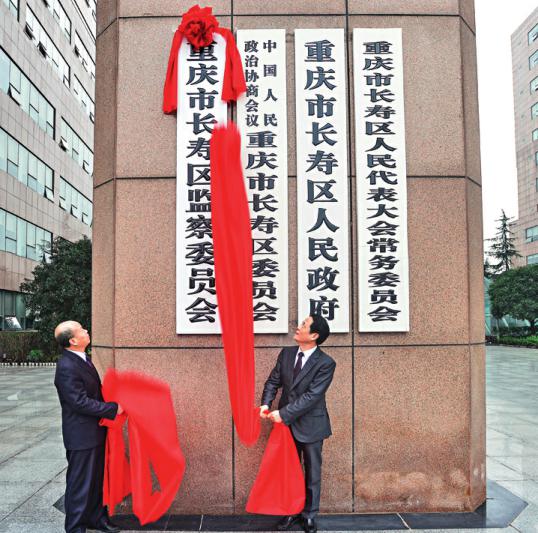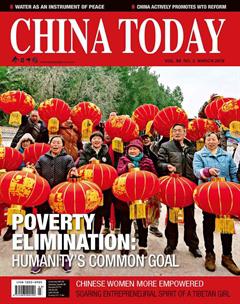Deepening Reform of the Supervisory System to Intensify the Fight Against Corruption
By LIU XIAOMEI
FIGHTING against corruption according to the law is a hallmark of Chinas anti-corruption campaign since the 18th National Congress of the Communist Party of China (CPC), convened in 2012; and creating a sound, law-based supervisory system is a key focus and task of Chinas efforts to establish a system of socialist rule of law with Chinese characteristics and comprehensively advance law-based governance. In 2018, both the government and the CPC stepped up the formulation of laws and Party regulations for the fight against corruption.
A solution that addresses the root cause of corruption lies in better supervision of power and institutional prevention of the abuse of power. Since 1954, when the first Constitution of the Peoples Republic of China was adopted, China has been implementing the peoples congress system, which, differing from the separation of powers and checks and balances, features democratic centralism in the structure of state power and state organs. Supervision is an important means of restraining power for the exercise of democratic centralism. With great emphasis on supervision, China has put in place a multicomponent supervisory system that includes disciplinary supervision, supervision by the peoples congress, judiciary supervision, legislative supervision, auditing supervision, and supervision by the procuratorate for corruption and dereliction of duty.
However for many years, with the supervisory power in different authorities, implementation of the aforementioned supervision mechanism and measures overlapped and was fragmented. As a result, political resources were scattered and squandered; there existed supervisory power of varying levels and status in the system of state power which impaired the effect of restraining power; the absence of top-level design led to uneven intensity and even blind spots of supervision, giving rise to corruption.
In order to effectively prevent and punish corruption, we need to deepen reform of the national supervision system to overhaul and integrate supervisory power, build a centralized, unified, and efficient supervision system of great authority, ensure the independence and raise the status of supervisory power. Thereby we can make supervisory power a check and balance on decision-making power, hence forming a mechanism that restrains power with power.
Improving the Setup of Supervisory Organizations and Strengthening Anti-Corruption Agencies
By February 2018, supervisory commissions had been set up across China at the provincial, prefectural, and county levels. The following month, the National Peoples Congress reviewed and adopted amendments to the Constitution and the Supervision Law, under which the national supervisory system was established. Within the system, the national supervisory commission exercises leadership over regional supervisory commissions, and the commissions at higher levels exercise leadership over those below them. On March 23, 2018, the National Supervisory Commission was officially inaugurated, standing shoulder to shoulder with the State Council, the Central Military Commission, the Supreme Peoples Court, and the Supreme Peoples Procuratorate under the National Peoples Congress and its Standing Committee as the supreme state organs of China. In regions at the county level and above, the political structure is similar: under the regional peoples congress and its Standing Committee are the regional government, supervisory commission, peoples court, and peoples procuratorate.
Under the reform to transfer the power of investigating duty-related crimes from the procuratorate to the supervisory commission, last year, more than 44,000 anti-corruption officers with procuratorial organs at four levels were transferred to supervisory commissions. In line with the provision of the Supervision Law on setting up representative offices of the supervisory commission, regional supervisory commissions across the country have been exploring effective ways to extend supervision to the primary level to combat corruption that impacts the lives of average citizens.
Supervisory power serves as a check of other power in Chinas political system. The Constitutions provision on the composition, power, and responsibilities of the states supervision organ defines supervisory power as independent constitutional power, putting it, in a sense, on par with legislative power, administrative power, and judicial power. Supervisory power is meant to achieve a structural balance between the power to supervise and the power to be supervised, and build a sound mecha- nism to check and supervise the exercise of power, and hence meet the requirement of rule of law that “with power comes obligations, and exercise of power is subject to supervision.”
There are two sides to heightened supervisory power. On one hand it intensifies the fight against corruption and can therefore deliver better results; on the other, over concentrated power may give rise to the question “who will supervise the supervisor?” In the spirit of and according to the requirement of rule of law, clear boundaries should be drawn for the supervisory commissions power which should not be transgressed. Measures have been put in place to address this issue, with the most important being the disposition, restriction, and supervision of the commissions power by the Peoples Congress.
Under the amended Constitution, the Internal and Judicial Affairs Committee of the National Peoples Congress has been renamed to be the Supervisory and Judiciary Committee, and this committee has also been established under regional peoples congress at all levels around the country to oversee and inspect the enforcement of supervisory laws and regulations and give advice on problems they detect. According to Article 53 of the Supervision Law, last year supervisory commissions at the provincial, prefectural, and county levels in many regions delivered reports to the standing committee of local peoples congress, following the requirement that they are responsible to and supervised by the peoples congress at the same level. In return, the peoples congress will exercise and strengthen supervision on the supervisory commission through various means and measures including inspection of the enforcement of the Constitution, Supervision Law, other laws and regulations, inquiry, investigation, and removal from office.
Extending Supervision to All Office Holders and Building a Tight Net of Supervision
The goal of setting up the supervisory commission is to put all public officials who exercise public power under supervision and punish corruption with zero tolerance. Being a specialized organ responsible for exercising state supervisory functions, the supervisory commission works together with the Partys disciplinary inspection commission as one office. It conducts supervision and inspection of public officials concerning execution of duty and ethics, and investigates duty-related violations and crimes.
Article 15 of the Supervision Law stipulates that the supervisory commission exercises supervision on the following people: 1) Civil servants of organs of the CPC, organs of peoples congresses and their standing committees, peoples governments, supervisory commissions, peoples courts, peoples procuratorates, organs of Chinese Peoples Political Consultative Conference committees at all levels, organs of non-CPC parties and associations of industry and commerce, and personnel managed, mutatis mutandis by the Civil Servant Law of the Peoples Republic of China. 2) Personnel engaged in public affairs at organizations managing public affairs based upon authorization by laws or regulations or lawful entrustment by state organs. 3) Managers of state-owned enterprises. 4) Personnel engaged in management of public entities in education, scientific research, culture, health care, and sports, among others. 5) Personnel engaged in management at basic-level self-governing mass organizations. 6) Other personnel who perform public duties in accordance with the law.
This, for the first time puts under supervision the people who are not CPC members or civil servants but exercise public power. As a result, the number of people under supervision increased by more than 10 million nationwide. With progress in the work of supervisory commissions at the provincial, prefectural, and county levels, supervision will cover the whole nation. Last year, disciplinary inspection and supervisory organs across the nation received 3.44 million petitions, handled 1.67 million tip-offs, made 241,000 inquiries, filed 638,000 cases, and punished 621,000 people (including 526,000 for violation of Party discipline). These mark a year-on-year increase of 25.9 percent, 33.3 percent, 20.1 percent, 21.1 percent, and 17.8 percent respectively.
Improving the Legal System
In building a legal system to combat corruption, the focus is placed on basic lawmaking and legislation in key areas. Last year, in addition to the amended Constitution, several national laws and Party rules were promulgated or revised, including the Supervision Law, the Law of International Criminal Judicial Assistance, the Criminal Procedure Law, the CPC Regulations of Disciplinary Punishment, and Rules on Supervision and Enforcement of Party Disciplines for Party Discipline Inspection Organs. More than 30 administrative and Party decrees were issued, including the Measures about Special Supervisors of the National Supervisory Commission. Besides, regions with the right to make regulations introduced a number of detailed rules and regulations for the implementation of the Supervision Law.
These laws and regulations closely focus on the needs of deepening the reform of Chinas supervisory system, serve the goal of enforcing the Constitution and the Supervision Law, and realize alignment between different laws as well as between laws and regulations. They have further improved Chinas anti-corruption legal system. For instance, the amended Criminal Procedure Law strengthens the connection between criminal procedure and supervision; the Law of International Criminal Judicial Assistance establishes the legal system to hunt down fugitives implicated in duty-related crimes and retrieve their illegally-gained wealth; the CPC Regulations of Disciplinary Punishment aligns Party rules with national laws; and the Rules on Supervision and Enforcement of Party Disciplines for Party Discipline Inspection Organs further regulates duty-related activities of Party organs for disciplinary inspection. These clearly stratified and well integrated national laws and Party rules lay a solid foundation for disciplinary inspection and supervisory agencies to perform their duties according to law, and provide the guarantee for standardized, institutionalized, and lawbased efforts to combat corruption. They are significant achievements in Chinas anti-corruption campaign.

